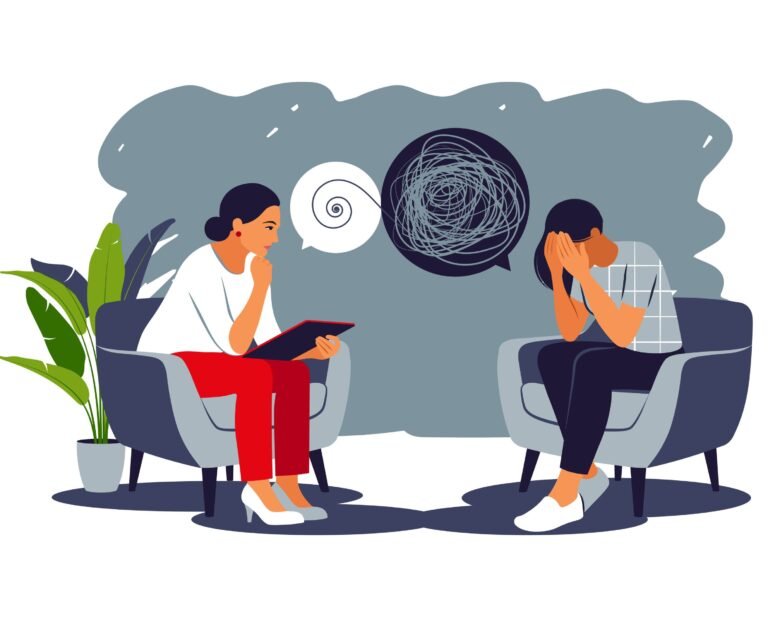Home » Mindfulness Therapy
Learn to cultivate a peaceful mind with mindfulness therapy.
Mindfulness therapy can decrease negative emotions and enhance positive ones for an overall improved quality of life.

What is Mindfulness Therapy?
Mindfulness therapy is a general term that refers to types of talk therapy that incorporate mindfulness practices. The two most well-known types are mindfulness-based cognitive behavioural therapy (or mindfulness-based cognitive therapy), and mindfulness-based stress reduction therapy.
The concept of mindfulness itself stems from ancient Eastern philosophies like Buddhism and Hinduism, but it’s now become a well-studied and widely used component of Western psychology as well. It centers on the idea of becoming aware of the present moment through both internal and external observation. This usually involves becoming attuned to inner thoughts and emotions, physical responses to external stimuli, and consciously noticing the environment.
Mindfulness techniques are rarely used on their own as a complete therapeutic intervention but are instead a helpful layer to add to other forms of therapy. There is a wide array of mindfulness techniques and tools at therapists’ disposal, and incorporating them skillfully into other forms of therapy can increase their effectiveness and provide additional benefits.
How Does Mindfulness Therapy Work?
Mindfulness is a skill that can be improved upon over time, and mindfulness-based therapies are an excellent way to achieve this. Some common techniques used to cultivate mindfulness within mindfulness-based therapy are meditation, breathing exercises, and visualization techniques. Other helpful tools that can be done outside of therapy are yoga or walking meditation.
These various techniques can increase self-awareness which in turn may make talk therapy more effective. An example of this is using mindful observation to gain clear insight into thought patterns since this is the first step of cognitive restructuring—a process done in cognitive behavioural therapy to change negative thinking habits.
More generally speaking, mindfulness can reduce rumination, improve emotional regulation, reduce stress and even increase acceptance. These concerns often play a role in common mental health concerns such as anxiety and depression.
Mindfulness practices can lead to all of these beneficial effects because they increase a client’s ability to have a controlled response to stimuli instead of functioning through impulses and habits.
Is Mindfulness-Based Therapy Right For Me?
Mindfulness-based therapy has broad applications that make it potentially beneficial for most people, and it’s rarely contraindicated. The few instances where it’s not recommended are for anyone with post-traumatic stress disorder, bipolar disorder or psychosis.
These situations aside, mindfulness-based practices have been shown to help with issues such as anger management, anxiety, chronic pain, stress, depression, obsessive-compulsive disorder, attention deficit hyperactivity disorder (ADHD), eating disorders, insomnia, as well as general mental wellbeing.
Mindfulness modalities may even help increase physical health by reducing stress. Experiencing chronic high stress is a risk factor for many illnesses including heart disease, diabetes, digestive problems and headaches.
Overall, mindfulness therapy approaches are worth trying out for anyone who wishes to improve their mental and physical wellbeing. They may not be able to treat severe mental illness, but they can be a useful component of therapy for most people.
How Can Mindfulness Therapy Help?
Improving mindfulness can promote a greater sense of peace and wellbeing for anyone, but clients who feel especially distressed will likely have the most to gain. It can offer a much-needed sense of relief from what otherwise feels like a constant struggle.
Mindfulness therapy also promotes positive behaviour change since it puts the client back in the driver’s seat of their emotional responses so they can act in intentional ways. This makes it an empowering skill to learn that can lead to wiser choices and increased self-esteem.
Perhaps the most valuable aspect of mindfulness tools is not just the changes they bring, but their accessibility. Techniques learned in mindfulness-based therapy can be applied outside of sessions in everyday situations whenever the need arises.
These in-the-moment techniques are lifelong skills that can create more resilient mental health for many years to come.
Schedule a Free Consultation
Schedule a consultation to enhance your sense of focus on the present and well-being with Mindfulness Therapy. Our online sessions teach you how to take control of your emotional responses, making intentional choices and building self-esteem. The techniques learned can be applied in everyday situations, providing lifelong skills for resilient mental health.

